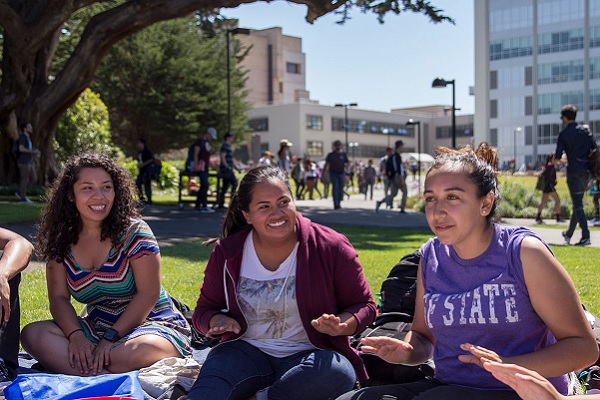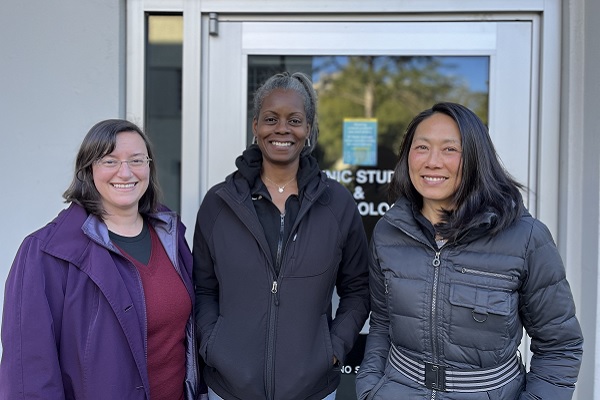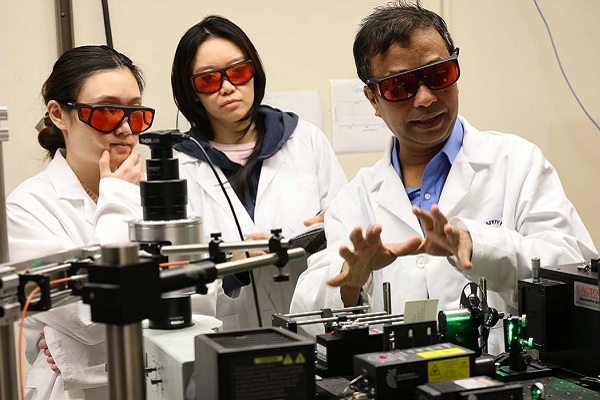News & Announcements

Explore SF State is the University’s signature spring event for admitted students and their families — a day for them to visit campus, make connections and learn about life as a Gator. You can help them feel that they’ve found their home at SF State by serving as a volunteer ambassador.
Explore SF State will take place Saturday, April 22. Ambassador shifts are 8 a.m. – 3 p.m. Lunch and T-shirts will provided for all who help for the day.
Learn more about Explore SF State, or sign up today to welcome our newest students!

Through a Department of Education Asian American and Native Pacific Islander (AANAPISI) Grant, the Responsive Education for Access, Community, and Hope (REACH) Program, in partnership with the Office for Student Financial Aid (OSFA), is working to create and implement culturally responsive financial literacy programs and curriculum to increase the financial knowledge and capability of students. Meredith Safran, Michelle Toney and Candace Low (pictured left to right) are REACH financial literacy coaches for spring 2023. The financial literacy workshops address topics such as student tuition, navigating financial aid, paying for college, scholarships, money management, savings, work opportunities, understanding credit reports and scores, and more. Low, Safran and Toney can speak in-person or online in classrooms, student clubs or departments across campus. Workshops can be tailored and can run from 10 minutes to one hour. Learn more about the workshops or sign up for a session via Qualtrics.

From microscopes and cameras to night vision devices and optical fiber communications, photodetectors have a wide array of applications. Photodetectors capture and convert light into electrical signals but are often limited to detecting a narrow part of the wavelength spectrum. The materials used to make these devices often hamper efforts to make improved broadband nanoscale photodetectors.
A new device from Physics & Astronomy Associate Professor AKM Newaz and his graduate student Hon-Loen Sinn may overcome some of these challenges. In a new Advanced Photonics Research paper, the team and their Stanford University collaborators describe the impressive properties of their photodetector that has improved sensitivity in the ultraviolet (UV) to near-infrared light range. They’ve submitted a provisional patent for their device and are working on the main patent application.
“A UV [ultraviolet] photodetector is very useful for [a range of applications from] biology to space astronomy to fire monitors. All these current communication channels [use] the visible range and infrared …,” Newaz said. “We don’t have many higher efficiency UV photodetector devices, so people don’t use UV.”
Newaz’s lab studies atomically thin semiconductor materials such as molybdenum disulfide (MoS2) to create broadband nanoscale photodetectors. Newaz is excited about the new paper, particularly because it showcases the caliber of research performed by SF State students, noting that the lead author was a master’s student in his lab. “This publication is Ph.D.-student quality work, and it was done by a master’s student at SF State,” he said.
Learn more about the paper and Newaz’s lab at SF State News.
The Division of Undergraduate Education and Academic Planning is pleased to announce that the new Undergraduate Advising Center (UAC) is now open in ADM 203. The center serves all undergraduate students and is now home to the first-year and undeclared advising team as well as academic advisors from all of the colleges. With the opening of the new center, the college-based advising centers have now closed.
Please refer all undergraduate students to the UAC if they are looking for academic advising. The center offers advising appointments both in-person and via Zoom. Drop-in advising hours are also available Monday through Friday from 10 a.m. to noon and from 2 to 4 p.m. Please see the Undergraduate Advising Center website for specific details regarding the types of services offered and how to make an appointment.
The Division of Undergraduate Education and Academic Planning will be hosting a reception for the campus community soon, but you are welcome to stop by now to see the new space!
San Francisco State University is hosting a site visit by the WASC Senior College and University Commission (WSCUC) April 5 – 7, in connection with its accreditation. The team has requested open meetings with staff and faculty to provide an opportunity for informal input from all members of the campus community about their experiences with the institution. The meetings will be in-person.
- The Staff Forum will be on Thursday, April 6, from 11:15 a.m. to 12 p.m. in HSS 154.
- The Faculty Forum will be on Thursday, April 6, from 2 to 2:45 p.m. in HSS 154.
If you can’t attend the forum, a confidential email is available to contact the review team. Only authorized WSCUC staff and team members have access to it. The emails are not viewed by any representative of the institution. The team is not able to meet individually with members of the campus community, so please do not use the email account to request private appointments. To write to the WSCUC team, please address your email to sfsu@wscuc.org.
University Budget Committee (UBC) seeks new members to join the committee. Three staff seats and one faculty seat open beginning August 2023 for three-year terms. UBC meets monthly during the academic year and is charged with providing advice and recommendations related to budget policy and planning to the University president. For a list of current members and to learn what the committee does, view the UBC website.
All staff and faculty are welcome to nominate themselves or a peer. The nomination deadline is Friday, April 14. Email ubc@sfsu.edu for a nomination form.
Nominations for the 2023 distinguished faculty and staff awards are now open. These awards are an opportunity for our campus to recognize and honor outstanding tenured faculty, full-time lecturers and staff who have demonstrated significant, long-term contributions to the University and to their disciplines. By recognizing the achievements of distinguished faculty in the areas of teaching, professional achievement and growth, and service (faculty and staff), the campus community celebrates the University’s climate of excellence. Visit the Academic Senate website and the Faculty Honors and Awards Committee website to complete the online nomination form by Monday, April 10.
The DFSA committee will identify five award recipients. Serving on the DFSA committee will be:
- Fatima Alaoui
- Leia Bagesteiro
- Rosa Carmoa
- Catriona Rueda Esquibel
- Zhaoshuo Jiang
- Mohammed Nadeem
- Todd Roehrman
- Aiko Yoshino
If you have any questions, please contact members of the DFSA committee.
Health Promotion & Wellness (HPW) is now hiring for its HPW Student Leader Program for 2023-2024. It is a paid position, up to 15 hours per week, and an academic year commitment from August 2023 – May 2024. This program provides meaningful professional development training, networking, skill-building and health education opportunities for SF State students. HPW student leaders facilitate workshops, conduct presentations, develop new programs, lead marketing campaigns and plan health and wellness events.
Please share this opportunity with your students. The deadline to apply is 5 p.m. Friday, April 7. Students can visit the HPW website for more information and to apply.
The Science, Technology, and Society Hub is hosting a public showcase of SF State COVID research and a closed meeting for Bay Area researchers working on “viral politics” on Friday, April 14. The public showcase will be from 1 – 3 p.m. and the closed meeting from 3 – 4:30 p.m. in LIB 121. Fill out a Qualtrics registration form if you are interested in participating or would like more information about the research network being built.
Contact Associate Professor of Women and Gender Studies Martha Kenney at mkenney@sfsu.edu with any questions.
The Academic Senate will meet Tuesday, March 14, from 2 to 4:30 p.m. virtually via Zoom and in person at the Seven Hills Conference Center for its eleventh meeting of the academic year. Visitors who wish to attend please contact the senate office at senate@sfsu.edu for a Zoom link. The agenda includes:
- Recommendation from the Educational Policies Council: Discontinuance of the Master of Science in Recreation Parks and Tourism, consent item.
- Recommendation from the Educational Policies Council: Suspension of the Bachelor of Arts in Family & Community Science, consent item.
- Recommendation from the Strategic Issues Committee: Revision to S01-087 Administrative Review Committee, in second reading.
- Recommendation from the Academic Policies Committee: Credit for Prior Learning Policy (new), in second reading.
- Recommendation from the Academic Policies Committee: Revision to the Syllabus Policy #S15-257, in second reading.
- Recommendations from the Campus Curriculum Committee, Distance Education Authorization, in first reading
- B.A. in Apparel Design
- B.A. in Apparel Merchandising
- B.A. in Italian
- B.A. in Political Science
- B.A. in Cinema
- B.A. in Humanities
- Minor in Humanities
- Minor in Persian Studies
- Recommendations from the Campus Curriculum Committee in second reading:
- B.A. in Psychology, Degree Completion
- B.A. in Classics, Distance Education Authorization
- M.A. in Classics, Distance Education Authorization
- B.A. in Communications, Distance Education Authorization
- M.A. in Communications, Distance Education Authorization
- Certificate in Conflict Resolution, Distance Education Authorization
- Minor in Criminal Justice Studies, reducing 20%
- Minor in Recreation, Parks and Tourism, reducing 20%
- B.S. to B.A. in Recreation, Parks and Tourism, reducing 20%
- Minor in Queer and Trans Ethnic Studies, Name Change
- Formal presentations from:
- Special Assistant to the President and Provost Teddy Albiniak, “Strategic Planning Update.”
- Vice Provost of Academic Planning and Dean of Undergraduate Education Lori Beth Way and Associate Dean of Academic Planning Jane DeWitt, “WASC visit.”
- Vice President of SAEM & Title IX Coordinator Jamillah Moore, “The State of Student Affairs and Enrollment.”
The full agenda, meeting materials and minutes can be found on the senate website.
UC Irvine School of Education Professor Gustavo Carlo will give the Psychology Department’s Distinguished Speaker Colloquium from 12:10 to 1:30 p.m. Wednesday, March 15, in LIB 121. The title of the presentation is “Socialization of Prosocial Behaviors in U.S. Latine Youth.”
The campus community is invited to join author and Professor Emeritus of Communication Studies Carol Wilder for a reading from her book “Living Northern California 1975-1995” from 2 to 4 p.m. Monday, March 27. Former Gov. Jerry Brown said of the book, “In vivid and fast-paced prose, Wilder brings to life this legendary period.” Participants can join in-person (LIB 121) or online via Zoom. (Register for Zoom access.) The in-person event will be followed by light refreshments. Masks are recommended.
This event is sponsored by the College of Liberal & Creative Arts and the Department of Communication Studies, Department of History, Department of Humanities and Comparative World Literature and the J. Paul Leonard Library.
Join the Office of Diversity, Student Equity and Interfaith Programs for a presentation by Alystar Sacks, assistant regional director, ADL Pacific Region, on antisemitism and how you can respond. In-person and online options will be available. In-person attendees will get a light lunch and the opportunity to participate in a post-presentation workshop; however, a Zoom option will be available for the main presentation. Please RSVP online. The event will take place in the Student Services Building (SSB), Room 404 from noon to 1:30 p.m. For more information or accommodations, please contact Danille Hoffer at dhoffer@sfsu.edu.
The Annual Longmore Lecture in Disability Studies will present the Kathryn Kenley-Johnson Memorial Lecture Thursday, March 30, from 4 to 5:30 p.m. in LIB 121 as well as online via Zoom. Described as “A Queer Crip Sex Archival Project,” this year’s lecture is titled “In Contestation: Feminist Challenges and Change Keynote.” The event will feature educator, sexologist and curriculum designer Bianca Laureano. By the end, participants will be able to:
- Identify options to create accessible archives
- Explore the role of using revolutionary love as a framework for archival work
Learn more and get the Zoom link on the Department of Women and Gender Studies website.
This event is co-sponsored with the Paul K. Longmore Institute on Disability. American Sign Language (ASL)/Closed Captioning (CC) will be provided.
The School of Theatre & Dance at SF State presents University Dance Theatre 2023 March 30-April 2 in the Little Theatre, located in the Creative Arts building. Guest choreographer Marlayna Locklear will offer new work from her extensive contemporary and jazz dance background. After graduating with a BFA from the University of the Arts in Philadelphia, she performed with the Cleo Parker Robinson Dance Ensemble, Dallas Black Dance Theatre II, Deeply Rooted Dance Theatre and Dayton Contemporary Dance.
Acclaimed dance faculty choreographers ArVejon Jones and Ray Tadio will also present new works. Jones dedicates his piece, “assuage means to soften,” to those who have spent their entire life as the foundation for others, giving without being asked, loving without expectation — to those who have forgotten who they are, what they’ve done, and who they have affected. Tadio’s new work, “Roxy,” pays homage to prolific pop artist Keith Haring. The choreography features late 1980s music from Haring’s New York City club hangouts and a short film directed by Dance and Cinema major Johan Casal.
Joining the program is Theatre Arts master’s student Aikaterini Bousleli, who hails from Greece. Based on the tragedy “The Suppliants” by the ancient Greek playwright Aeschylus, Bousleli’s new work is titled “Iketis” (pronounced hikétēs). Bousleli examines the undying hope of each Hiketis or migrant/refugee to create a new life under dire circumstances.
University Dance Theatre 2023 comprises an ensemble of 19 dancers in this exciting new choreography showcase.
There will be a talkback following the Sunday, April 2, performance. Showtimes are Thursday, March 30, and Saturday, April 1, at 7 p.m. and matinees Saturday and Sunday at 2 p.m.
Tickets are $5 for students, $8 general admission. To purchase, visit the School of Theatre & Dance website.
SF State Spotlight
American Indian Studies (AIS) lecturer faculty Paul Steward (Pomo, Elem Indian Colony) was honored as part of the 2023 Yerba Buena Center for the Arts 100 list for his work promoting Pomo culture and language in his music and as an educator in AIS.
On Feb. 22, KQED aired final projects from the Journalism Department’s new Audio Journalism class taught by Assistant Professor Joshua Davis. The hour-long special is titled “The Future of the Bay.” The broadcast features student reports from around the community covering artificial intelligence, art, food fusion and affordable housing. Sebastian Mino-Bucheli (B.A., ’21) co-produced the special with Davis.
The Civic Learning and Democracy Engagement Coalition has brought together education and policy organizations from across the nation committed to accelerating the spread of college students’ civic learning for an engaged democracy by making it a priority across higher education in public policy. The coalition has invited SF State’s Metro College Success Program to share its work, highlighting it as a national model of the coalition’s goals to marry educating social changemakers with achieving equity in college completion.
The conveners identify Metro as a student success program emphasizing wraparound services and data analytics, combining these evidence-based supports with a highly intentional and equity-oriented curriculum that builds students’ readiness to tackle our nation’s complex societal problems. Metro’s positive impact on retention and graduation rates for historically underserved students suggests an important new direction for the student success movement.
Professor and Chair of Economics Anoshua Chaudhuri gave a presentation at the Feb. 27 meeting of the San Francisco Small Business Commission. She presented her community-based participatory research project on the state of recovery of San Francisco’s small businesses post-pandemic. Small business receipts have shrunk, there are more micro-businesses in San Francisco and many businesses have changed their modes of operation. To thrive, businesses need access to loans and grants, more customers, safer streets and security systems.
A Feb. 21 story on Yale Environment 360 about protecting frog populations from a deadly fungus cites research by Biology Professor Vance Vredenburg.
Vredenburg’s study produced the first field evidence that bathing frogs in solutions of probiotics could be an effective antifungal treatment.
“In 2010, Vredenburg bathed some mountain yellow-legged frogs in a J. lividum solution and others in pond water, then released them in the Sierra Nevada,” the story states. “Upon his return a year later, he found none of the pond-water frogs, suggesting they had died — but he did find 39 percent of the frogs that had been treated with bacteria. It was the first field evidence that probiotics might work.”
As part of the global celebration of the 50th anniversary of hip hop, Africana Studies Lecturer Dave “Davey D” Cook wrote an opinion piece for Pollstar on Feb. 20.
“The hip-hop takeover of the [2023] Grammys was a reminder that hip hop is deeply woven in the fabric of modern-day music and it is perched to reach even greater heights,” Cook writes.
Associate Professor of Kinesiology Jimmy Bagley and co-authors published a topical review article in the Feb. 15 issue of The Journal of Physiology titled “The Myonuclear Domain in Adult Skeletal Muscle Fibres: Past, Present and Future.”
Also on Feb. 15, Bagley was quoted in an article in Men’s Health on using virtual reality to exercise. “Many people think these games are gimmicky,” Bagley said. “But now that we’re doing this testing, it’s clear that it is exercise.”
Along with the confounding new rules in Major League Baseball comes a revelation from Mathemetics Associate Professor Kimberly Seashore: the shape of a baseball field is not a diamond. Seashore identifies it as more of a “convex kite.”
“You could say it’s a kite since a kite has two pairs of adjacent equal-length sides,” Seashore told The San Francisco Chronicle on March 4. “The lengths from home to first and from home to third are equal, and the lengths from first to second and from third to second are equal.”